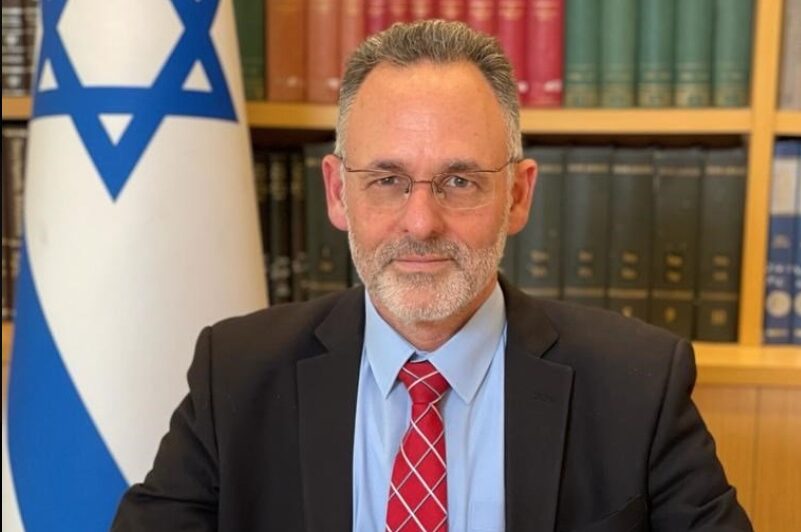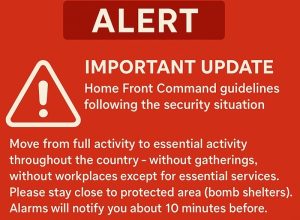On the third day of Israel’s air campaign targeting nuclear and military sites in Iran, Israeli Ambassador to Canada Iddo Moed urged Canada and its G7 partners gathering this week in Kananaskis, Alta., to increase coordinated pressure on the Islamic Republic, prevent further escalation, and act decisively to stop its race toward nuclear capability and regional domination.
“A nuclear-armed Iranian regime, with thousands of long-range missiles, is not just a problem for Israelis—it puts at risk the peace and prosperity of all people, including Canadians,” said Moed in a statement June 15. “That’s why it’s so important for world leaders at the G7 to support Israel’s right to defend its people and to unite to put an end to the Iranian threat.”
The regime has accelerated the completion of its nuclear weapon (nine atomic bombs), says Moed, and dramatically expanded the production of its arsenal of 10,000-20,000 long-range ballistic missiles. “It was moving from preparation to implementation of a plan to eliminate Israel. Faced with this reality, Israel was left with no choice but to act decisively, in what was the last window of opportunity to prevent catastrophe.”
In an interview Monday, Moed told The CJN “Israel is at the 11th hour. It’s very clear we have to act.”
He said the Israeli strikes inflicted significant damage to Iran’s nuclear elements and its leading scientists, including the Natanz enrichment and Isfahan conversion facilities. “We wiped out critical knowledge production assets. This is very, very significant and these are the main goals for us.”
Iran’s ballistic missiles are also weapons of mass destruction, he says. “They have and are seeking tens of thousands of ballistic missiles and have accelerated their rate of production. We’ve seen the damage they have done in the streets of Tel Aviv and the casualties, which are very significant. I should add when the same programs seek to make these weapons reach further into Europe, we ask ourselves why.”
Meanwhile, Canadian Foreign Affairs Minister Anita Anand posted on Saturday, “Canada firmly supports Israel’s right to defend itself in the face of Iranian attacks,” reiterating what she told Israeli Foreign Affairs Minister Gideon Sa’ar. She also thanked Israeli firefighters who helped rescue a Canadian embassy staff member in a building struck by a missile in Tel Aviv. This followed another post declaring, “Canada condemns Iran’s attack on Israel, and urges restraint on both sides. Further actions can cause devastating consequences for the broader region.”
U.S.-Iran negotiations represent the best path to achieving a lasting and peaceful resolution to Iran’s nuclear program, said Anand. “Iran cannot obtain nuclear weapons. Iran’s continued efforts to pursue nuclear weapons, support for terrorists, and direct attacks on civilian centres embody Iran’s persistent threat to regional stability and to Israel, which has the right to defend itself. Canadians in the region are encouraged to remain vigilant and to register with the embassy in order to receive timely updates.”
The posture of that messaging is a far cry from a couple of weeks ago, when Prime Minister Mark Carney’s government used far more muscular language aimed at Israel regarding Gaza and the West Bank, which drew criticism and pushback from Israel and Jewish Canadians.
Iddo told The CJN his office has been in touch with Canadian officials “at the highest level” but would not elaborate. “We have good relations and one thing we want to do is make sure Canada fully understands.”
While there seems to be a general consensus among G7 leaders that Iran is the source of much of the unrest and instability in the region, all seem to insist, with the notable exception of U.S. President Donald Trump, that it be done through diplomatic means.
Iran must not be allowed to develop nuclear weapons, European Union president António Costa told reporters in Alberta Sunday, noting the issue should be addressed by diplomatic means. “Now is the time to give space for diplomacy and to give the opportunity to decrease the escalation between Israel and Iran.”
Costa was echoed by European Commission president Ursula von der Leyen, who said she spoke with Israeli Prime Minister Benjamin Netanyahu reiterating Europe’s commitment to peace and stability in the Middle East. “In this context Israel has the right to defend itself. Iran is the principal source of regional instability and we’ve always been very clear Iran can never have a nuclear weapon.” Von der Leyen also made the link between the Israel-Iran conflict and Russia’s war on Ukraine, reminding reporters that Iranian drones are hitting both Ukrainian and Israeli cities, adding “Europe remains committed to finding a lasting solution through a negotiated deal.”
“So diplomacy is war by any other means,” said Moed. “The point is, Israel is under a double imminent existential threat from Iran, which is why we launched.”
He said Israel now controls an aerial path to Tehran and operates freely to set further targets. “When you detect a malignant tumor, you have to remove it, it’s a priority. Our goal is clear, remove the immediate existential threat that is still ongoing, and the campaign is still ongoing.”
Moed said his office conveyed a similar message to the G7 summit, “to do whatever that’s in their power, in discussions, to ensure Iran doesn’t pose that threat to Israel, the Middle East and the whole world.”
Canada knows the seriousness of the threats posed by Iran said Moed, citing the 2023 CSIS report warning of Iran’s actions to interfere in Canadian life, its threats and harassment of anti-regime members of diaspora communities and allying with anti-western elements in its shadow war against Israel. These are not separate, distinct phenomena, says the Israeli ambassador. “It’s all combined, it’s a global issue, along with their nuclear program, missile program and their plan to annihilate the state of Israel. The international community must be aware and prevent Iran from achieving its goals.”
On day four of the campaign, June 16, as reported, deaths in Israel hit two dozen, and anywhere from 224 to more than 830 in Iran, as numbers are reported differently by the Iranian government and some western NGOs. Moed told The CJN, “Prime Minister Netanyahu mentioned at the launch of this campaign that he had nothing against the Iranian people, and wants to make sure the Iranian people stay out of harm’s way. That’s why we warn those in proximity to military targets: we want to make sure that innocent lives are spared.”
Asked if regime change is the natural end goal of such a campaign, particularly as there are significant diaspora communities opposed to the current Iranian leadership and indeed to the entire revolutionary regime, with some even welcoming the attack, Moed said that’s up for Iranians to decide. “If Iranians choose to change their government at any time, all of us have an interest in that.”
The ambassador said he is aware of the difficulties faced by Israelis stranded worldwide as airspace has been shut down and international flights to and from Israel have been cancelled. “Of course, we’ve had numerous calls from Israelis stranded here, but for now, as long as the airspace is closed, there is no plans for them other than to hold and wait.” The Israeli government has launched a plan to bring Israelis home, with El Al beginning to register passengers who were stranded abroad in order to begin setting up schedules to resume flights once airspace restrictions loosen and allow return flights home.
He also said Israel’s May 25 National Security Council travel advisory for Canada has not changed, and remains at Level 2 (potential threat), telling The CJN, “We’re not seeing any change in the risk assessment. We’re still seeing the rise in antisemitic attacks, and we’re very concerned about it, whether it’s against Israeli or Jewish centres. We see the intimidation and the near-violent and even violent demonstrations in cities, and we’re very concerned.”
Fighting multiple conflicts on multiple fronts, Moed also wants to remind the world “that there are still 53 Israeli hostages in Gaza, and Israel continues do what it can to get their release.”
According to news reports, Lebanon’s government told Hezbollah to stand down and not enter the fray on behalf of its Iranian benefactor. The Shiite terror group agreed, the militia in a dramatically weakened state following Israel’s September 2024 attacks on its manpower and arsenal, as well as for fear of dragging Lebanon into the war. As for concerns about the possibility that the terror group will ignore the Lebanese government’s directive, Moed said, “We are prepared for any eventuality. If Hezbollah attacks, we are prepared to strike back.”
“These are historical times in our world. We in Israel have seen evil up close from Hamas, we’ve seen indiscriminate and super explosive missiles coming from Iran, and Israel will do whatever Israel needs to do to protect themselves and its citizens, and the free liberal world needs to stand up for its values and protect them.”
His comment came minutes before Trump, exiting a first, brief round of bilateral talks with Carney, told reporters “Iran is not winning this war.” Asked if there’s any indication that Iran wants to deescalate and resume talks over its nuclear program, Trump said “They should have done that before. They had 60 days and on the 61st day I said we don’t have a deal. They have to make a deal…it’s painful for both parties,” he added, “but I’d say Iran is not winning this war. They should talk immediately before it’s too late.”
Author

Joel has spent his entire adult life scribbling. For two decades, he freelanced for more than a dozen North American and European trade publications, writing on home decor, HR, agriculture, defense technologies and more. Having lived at 14 addresses in and around Greater Montreal, for 17 years he worked as reporter for a local community newspaper, covering the education, political and municipal beats in seven cities and boroughs. He loves to bike, swim, watch NBA and kvetch about politics.
View all posts








